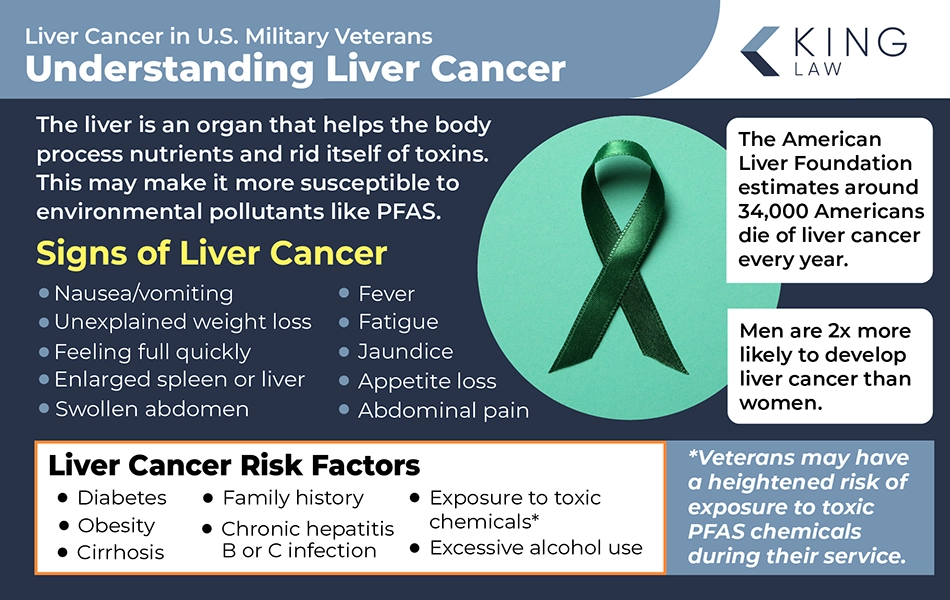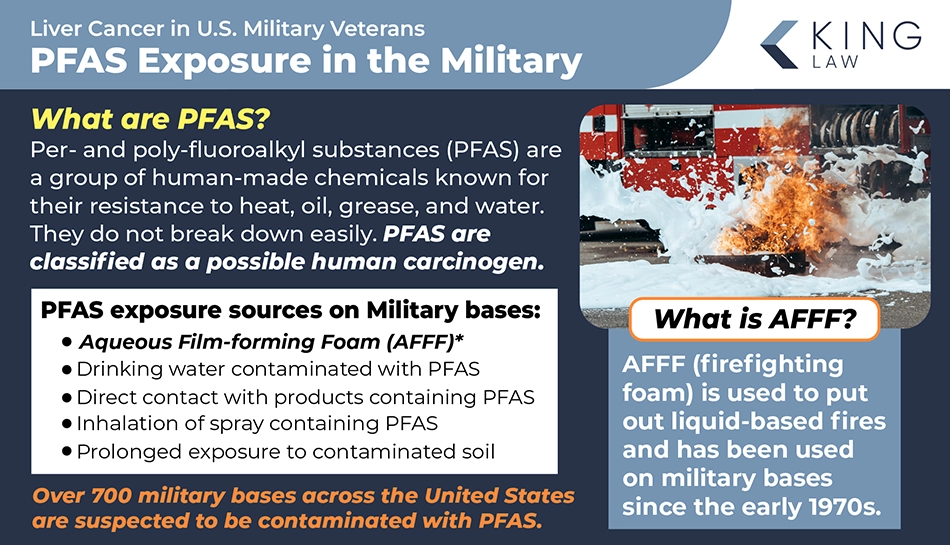
Studies show that military veterans may be at an increased risk of liver cancer due to service-related exposure to toxic chemicals, including per- and poly-fluoroalkyl substances (PFAS). For decades, the U.S. government has used products that contain PFAS, including aqueous form-filming foam (AFFF). Run-off from the foam contaminated water supplies and soil at military bases nationwide, putting service members and their families at risk for liver cancer.
PFAS exposure has been linked with a number of adverse health conditions, including an increased risk of developing certain kinds of cancers. Current and former service members are encouraged to stay vigilant, engaging in routine health exams and seeking legal advice if they are diagnosed with liver cancer or another PFAS-related condition.
About Liver Cancer in US Military Veterans:
Understanding Liver Cancer in Military Veterans
PFAS Contamination in the Military and Its Link to Liver Cancer
Military Bases and Personnel Most Affected
Legal Options for Veterans with Liver Cancer Due to PFAS Exposure
How King Law Can Help Veterans Affected by PFAS Exposure
Understanding Liver Cancer in Military Veterans
Today, liver cancer is a growing concern among military service members and their families. There are a number of potential causes of liver cancer, including mutations in a person’s DNA and chronic hepatitis infections. However, veterans are believed to be at an increased risk of certain forms of liver cancer, such as angiosarcoma and hepatocellular carcinoma, because of their exposure to per- and polyfluoroalkyl substances (PFAS). Exposure to high levels of PFAS has been linked with a 4.5 greater likelihood of developing some forms of liver cancer.
Hundreds of military bases throughout the U.S. are believed to be contaminated with these toxic chemicals. This contamination has put thousands of veterans and their families at risk of liver cancer and other serious diseases.
What Is Liver Cancer?
Liver cancer is a type of cancer that originates in the liver, an organ that helps the body process nutrients and get rid of toxins. It is believed that the liver’s role in filtering toxins may make it more vulnerable to environmental pollutants, including PFAS and other potentially cancer-causing chemicals. Veterans who were stationed or worked at military bases known to be contaminated with PFAS are encouraged to watch for signs or symptoms of liver cancer.
Potential symptoms of liver cancer:
- Nausea or vomiting
- Unexplained weight loss
- Appetite loss
- Feeling full after a small meal
- Swollen abdomen
- Jaundice
- Fever
- Abdominal pain
- Fatigue
- Enlarged spleen or liver
There are several types of liver cancer, with hepatocellular carcinoma (HCC) being the most common. Other types of liver cancer include intrahepatic cholangiocarcinoma and hepatoblastoma, but they are less frequently diagnosed.
Risk Factors for Liver Cancer
While there are several potential causes of liver cancer, certain individuals may be at higher risk for the disease. Current and former service members are encouraged to continue routine health exams and to contact a healthcare provider if any new symptoms arise or worsen.
Potential risk factors for liver cancer:
- Exposure to toxic chemicals: Veterans may be particularly at risk of prolonged PFAS exposure during their service.
- Chronic hepatitis B or hepatitis C infection
- Cirrhosis
- Diabetes
- Excessive alcohol use
- Family history of liver cancer
- Obesity
- Inherited liver diseases: Certain inherited liver diseases, such as hemochromatosis and Wilson’s disease

PFAS Contamination in the Military and Its Link to Liver Cancer
Perfluoroalkyl and polyfluoroalkyl substances (PFAS) are human-made chemicals that can be found in a number of different products. These chemicals are believed to be toxic to humans and the environment. The U.S. government has admitted to using PFAS-containing products, including aqueous film-forming foam, for firefighting training and operations. Legal documents allege that run-off from AFFF has contaminated the groundwater at military installations throughout the country and across the globe. Exposure to these chemicals has been linked to serious adverse health conditions, such as liver cancer.
What Are PFAS Chemicals?
Per- and polyfluoroalkyl substances (PFAS) are synthetic or human-made chemicals that are resistant to heat, oil, grease, and water. They are often referred to as “forever chemicals” because of their resistance to these elements, which results in poor breakdown in the environment.
When humans are exposed to PFAS, these chemicals may accumulate in the liver. As the organ that helps to rid the body of toxins, the liver may be more vulnerable to toxic chemicals. PFAS that accumulate in the liver may cause inflammation, fibrosis, and, in some cases, cancer.
The group of toxins known as PFAS have been classified as possible carcinogens, meaning they may cause cancer in humans. Animal studies show that exposure to PFAS may increase the risk of developing fatty liver disease and a type of liver cancer known as hepatocellular carcinoma (HCC). Additional studies are needed to determine the link between the two in humans; however, it is believed that it may be a result of the toxins’ ability to alter bile acid metabolism, amino acid, and glucose.
How Are Military Members Exposed to PFAS?
Military personnel may have been unknowingly exposed to PFAS and other toxic chemicals during their service. The U.S. Department of Defense continues investigating and analyzing military installations with known or suspected PFAS contamination. It is estimated that there are over 700 sites where current or former service members may have been exposed.
Potential routes of PFAS exposure at military bases:
- Exposure to AFFF: Exposure to aqueous film-forming foam (AFFF) used in firefighting training drills and emergency operations.
- Contaminated water: Drinking water contaminated with PFAS. It is believed that run-off from AFFF may have seeped into the groundwater at installations throughout the country and abroad.
- Skin contact: Direct skin contact with products containing PFAS, such as firefighting products.
- Inhalation: Inhaling spray or PFAS-containing product that becomes airborne.
- Environmental: Prolonged exposure to contaminated soil at a military base.
In addition to liver cancer, exposure to PFAS may increase the risk of other serious conditions, including, testicular cancer, thyroid disease, ulcerative colitis, and kidney cancer.

Evidence Linking PFAS to Liver Cancer in Service Members
Several scientific studies and reports have established a link between exposure to PFAS and liver cancer or an increased risk of liver cancer.
Studies linking PFAS exposure to liver cancer:
- National Institutes of Health (NIH): According to the NIH, exposure to PFAS may be a factor in the increased number of diagnosed liver problems and may be linked to markers of liver damage.
- Environmental Protection Agency (EPA): As reported by the EPA, exposure to widely used PFAS, such as Perfluorooctanoic Acid (PFOA) and Perfluorooctane Sulfonate (PFOS), may increase a person’s risk of developing certain kinds of cancer.
- Department of Veterans Affairs (VA): The VA acknowledges that PFAS exposure may cause serious health issues, including liver damage.
- National Library of Medicine: Studies show that firefighters have higher rates of cancer, which may be linked to their increased or prolonged exposure to toxic chemicals.
Military Bases and Personnel Most Affected
The U.S. government has admitted to using firefighting foams containing PFAS since at least the 1970s. It is believed that run-off from this PFAS-containing product has seeped into the soil and groundwater, contaminating military installations across the country. While many current and former military personnel may be at risk of exposure, some are at greater risk due to the base where they were stationed.
Military Bases With Known PFAS Contamination
It is estimated that over 700 military installations and training sites may have water contamination. Affected veterans or current service members diagnosed with liver cancer are encouraged to seek legal counsel.
Military bases where high levels of PFAs have been detected:
- Camp Pendleton
- Edwards Air Force Base
- Fort Bragg
- Fort Ord
- Joint Base Pearl Harbor-Hickman
- Joint Base Lewis-McChord
- March Air Force Base
- Fort Wainwright
- George Air Force Base
- Fort Jackson
- Travis Air Force Base
- MCAS Yuma
- Castle Air Force Base
Which Military Occupations Were Most at Risk?
While all current and former service members may have had PFAS exposure, some military occupations may place personnel at a higher risk. Individuals with prolonged exposure to PFAS due to their occupation in the military may be at an increased risk for adverse health conditions.
Military occupations with the highest risk of PFAS exposure:
- Firefighters
- Emergency responders
- Aircraft maintenance crews
- Hazardous materials managers
- Chemical manufacturing workers or processors
- Personnel stationed at bases known to have PFAS contamination
- Individuals living on or near military bases known to have contamination
Legal Options for Veterans with Liver Cancer Due to PFAS Exposure
Veterans diagnosed with liver cancer resulting from PFAS exposure during their service may be entitled to take legal action. It is essential to consult with an attorney as early in the process as possible to determine what legal options may be available.
Can Veterans with Liver Cancer File a Lawsuit for PFAS Exposure?
Veterans diagnosed with liver cancer may be eligible to file a lawsuit against a PFAS manufacturer such as 3M, DuPont, or Chemours. These manufacturers have paid out over $12 billion dollars related to PFAS claims. In addition to filing a lawsuit, veterans may seek disability benefits through the Department of Veterans Affairs if they can prove a service-related connection to their liver cancer. It can be challenging to prove this connection, which is why consultation with an attorney is strongly recommended. Finally, veterans may be able to join a mass tort case that consolidates cases against companies that may have exposed service members to toxic chemicals.
Who Qualifies to File a PFAS Liver Cancer Lawsuit?
Specific criteria must be met to file a PFAS liver cancer lawsuit. The best way to determine whether you meet the eligibility requirements necessary to file a claim.
Eligibility requirements to file a PFAS liver cancer lawsuit:
- Service: Service at a military base or installation confirmed to have PFAS contamination.
- Exposure: Exposure to aqueous film-forming foam (AFFF) or water contaminated with PFAS for six months or more.
- Residence: Lived on or within 1 mile of a military base.
- Diagnosis: Diagnosis of liver cancer or related liver disease.

Types of Recoverable Damages Available
Aggrieved veterans or current military personnel may be able to recover damages related to their cancer diagnosis and treatment. An attorney consultation is recommended to determine what damages may be available in a case.
Compensation options for veterans affected by PFAS-related liver cancer:
- Medical expenses: Compensation for medical bills, cancer treatments, and ongoing care.
- Lost wages: Recovery related to lost wages or a future loss of income.
- Pain and suffering: Compensation for physical pain and emotional suffering.
- Wrongful death benefits: Benefits related to the wrongful death of a veteran due to their service-related cancer or health condition.
- VA disability benefits: Disability benefits through the Department of Veterans Affairs for liver cancer that is connected to service.
How King Law Can Help Veterans Affected by PFAS Exposure
King Law has extensive experience handling PFAS-related claims for military personnel. Aggrieved veterans are encouraged to contact King Law to discuss their potential for compensation. We understand the difficulties associated with filing a claim related to your military service. We will support you throughout the process.
Navigating the Legal Process and Gathering Medical Evidence
Attorneys with King Law are well-versed in PFAS exposure cases. After determining eligibility, attorneys help clients navigate the legal process and gather all medical evidence, including investigating military exposure and consulting with expert witnesses.
Filing PFAS Lawsuits and VA Claims on Behalf of Veterans
King Law attorneys will assist with filing the PFAS lawsuit against manufacturers and VA disability claims, depending on the circumstances of the case. Throughout the process, the legal team will work to ensure that affected veterans receive the benefits and maximum compensation they deserve.
Maximizing Compensation for Veterans and Their Families
King Law fights to ensure veterans diagnosed with PFAS-related liver cancer receive full VA benefits and medical coverage. Our attorneys and legal partners will work diligently to make sure the largest possible financial recovery is received and that any wrongful death settlements are applied for and secured.
Contact a Military Liver Cancer Lawyer Today
Veterans diagnosed with PFAS-related liver cancer are encouraged to contact King Law for a case consultation by calling (585) 496-2648 or submitting an online form. A member of King Law’s intake team will contact you as quickly as possible and provide a detailed case evaluation.

